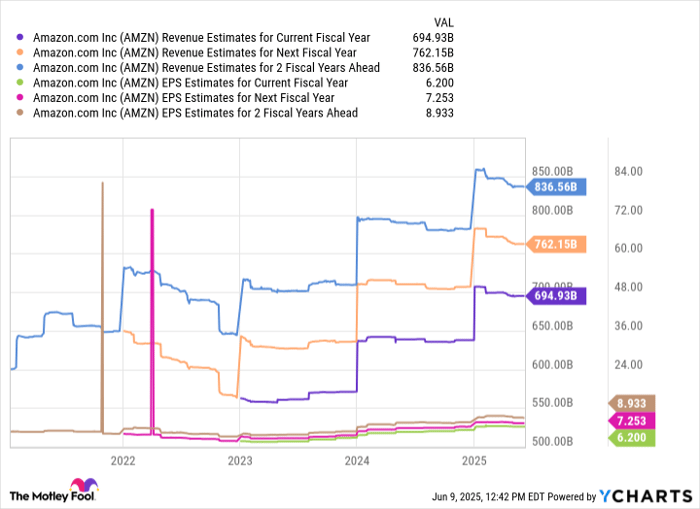Billionaire Bill Ackman Just Joined Warren Buffett and Cathie Wood by Adding This Monster Artificial Intelligence (AI) Stock to His Portfolio

Bill Ackman is a billionaire hedge fund manager as CEO of Pershing Square Capital Management. Unlike many of his peers on Wall Street, Ackman primarily keeps a tightly concentrated portfolio, with Pershing Square owning only about 10 stocks at any given time.
For the last couple of years, Pershing Square's most direct artificial intelligence (AI) investment has been a sizable position in Alphabet. Ackman has made it clear that its diversified ecosystem -- spanning internet search, cloud computing, advertising, cybersecurity, and more -- combined with an attractive valuation is what enticed Pershing Square to take a position in the "Magnificent Seven" member.
Where to invest $1,000 right now? Our analyst team just revealed what they believe are the 10 best stocks to buy right now. Learn More »
Well, just a few weeks ago, news broke that Pershing Square had recently initiated a position in another AI stock, Amazon (NASDAQ: AMZN). Ackman now joins Warren Buffett, whom he is known to admire, and Cathie Wood as prominent personalities on Wall Street who have exposure to Amazon, through their respective portfolios at Berkshire Hathaway and ARK Invest.
Let's explore what makes Amazon such a compelling AI stock for the long haul. I'll break down some trends in the business and the company's valuation to help explain why Amazon has earned the approval of Ackman, Buffett, and Wood.
Amazon has a compelling AI narrative and...
Given how hot AI has become, investors may be challenged to identify which opportunities are best suited for long-term positions. What I mean by that is while semiconductor stocks or AI software businesses have risen in popularity over the last couple of years, it's hard to know which of these companies will continue to be a market leader in 10 years (or longer).
To me, Amazon is like the business version of a Swiss Army knife. The company's core segments are e-commerce and cloud computing infrastructure via Amazon Web Services (AWS).
But it also has a thriving advertising business and a growing subscription service (Amazon Prime), and it has even made some progress in the streaming and entertainment landscape.
Similar to Alphabet, Amazon is uniquely positioned to stitch its various operating units together through more AI-powered services. In essence, by leveraging the power of AI, it can bolster both the consumer and enterprise sides of its business and make the platform increasingly sticky for its customers.

Image Source: Getty Images.
... the company's investments are already bearing fruit
While the ideas above sound great in theory, let's explore how the business has performed over the last couple of years since it started investing aggressively in AI.
The first headline-grabbing move it made in AI was its investment in OpenAI rival Anthropic. The thesis around this partnership was to train Anthropic's generative AI model on AWS -- essentially integrating the efficiency of large language models into the AWS platform.
Anthropic also agreed to use Amazon's in-house Trainium and Inferentia chipsets, providing the company with a direct avenue to begin scaling up a new part of its existing hardware business.
Since Anthropic joined forces with Amazon, AWS revenue has accelerated considerably. But more important, operating income from Amazon's cloud business has almost doubled!
AMZN Cash from Operations (TTM) data by YCharts; TTM = trailing 12 months.
When you consider that Amazon's AI-driven growth is primarily sourced through just the cloud business right now, it becomes clearer that the company can leverage its robust profitability to reinvest in other areas of its business and jump-start those, too. I think that comes into focus as Wall Street's consensus revenue and earnings estimates over the next few years suggest there is much more growth ahead.
AMZN Revenue Estimates for Current Fiscal Year, data by YCharts; EPS = earnings per share.
Is Amazon a buy right now?
Like many of its peers in the technology sector, Amazon has enjoyed a bit of a roller coaster ride so far this year. Shares bottomed at roughly $167 in April, which is likely when Ackman pounced. I say that because Pershing Square's position in Amazon was not included in the company's form 13F filing for the first quarter (ended March 31). If you had bought the dip in Amazon when Ackman did, you would have paid around 27 times forward earnings.
AMZN PE Ratio (Forward) data by YCharts; PE = price to earnings.
Among the 70 analysts who cover the stock, 66 rate it as either a buy or strong buy. Furthermore, with an average price target of $239, Wall Street's estimates imply there is still some modest upside.
While Amazon's valuation has expanded over the last month and a half, the company's long-run prospects and added AI-centric uses still make it a reasonable buy in my view.
Should you invest $1,000 in Amazon right now?
Before you buy stock in Amazon, consider this:
The Motley Fool Stock Advisor analyst team just identified what they believe are the 10 best stocks for investors to buy now… and Amazon wasn’t one of them. The 10 stocks that made the cut could produce monster returns in the coming years.
Consider when Netflix made this list on December 17, 2004... if you invested $1,000 at the time of our recommendation, you’d have $653,702!* Or when Nvidia made this list on April 15, 2005... if you invested $1,000 at the time of our recommendation, you’d have $870,207!*
Now, it’s worth noting Stock Advisor’s total average return is 988% — a market-crushing outperformance compared to 172% for the S&P 500. Don’t miss out on the latest top 10 list, available when you join Stock Advisor.
*Stock Advisor returns as of June 9, 2025
John Mackey, former CEO of Whole Foods Market, an Amazon subsidiary, is a member of The Motley Fool’s board of directors. Suzanne Frey, an executive at Alphabet, is a member of The Motley Fool’s board of directors. Adam Spatacco has positions in Alphabet and Amazon. The Motley Fool has positions in and recommends Alphabet, Amazon, and Berkshire Hathaway. The Motley Fool has a disclosure policy.










